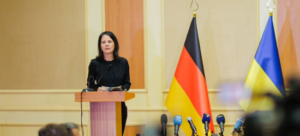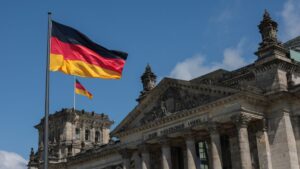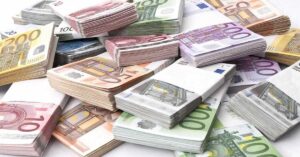
Germany will provide Ukraine with an additional EUR100 million in aid this winter, Reuters quoted the country’s Foreign Minister Annalena Berbock as saying.
During a visit to Moldova on Tuesday, she said that Russia continues to attack the Ukrainian energy infrastructure and is planning a “winter war to make the lives of people in Ukraine as horrible as possible.”
As reported, Russian Federation fired 127 missiles and 109 attack drones on the territory of Ukraine on August 26, 2024. The NEC Ukrenergo recognized this attack on energy facilities as the most large-scale one since the beginning of the war.
At the same time, Russian attacks on the Ukrainian energy infrastructure are recorded almost daily.

German authorities on Monday announced a decision to introduce temporary control at all land borders of the country starting September 16 to reduce the flow of illegal migrants, the Associated Press reports citing the German Interior Ministry.
“The ministry has informed the European Union of the decision to introduce border controls on the land borders with France, Luxembourg, the Netherlands, Belgium and Denmark for six months,” the agency reports.
“We are strengthening our internal security by taking concrete measures and continue to take a tough stance against illegal migration,” German Interior Minister Nancy Feser said.
Earlier, Germany also introduced controls at the borders with Poland, the Czech Republic, Austria and Switzerland.
Germany is a member of the Schengen zone, whose members abolish border controls on internal borders. However, in case of emergency, this control is allowed to be restored for a certain period of time.

By 2026, Germany aims to reduce its aid to Ukraine, relying on sources other than the federal budget. Capital gains from frozen Russian assets could be one such source.
It came as a shock to Ukraine and to all those who want to support Kyiv unconditionally: the German government apparently wants to end financial aid for military aid to Ukraine from the federal budget after next year and instead tap into an international pot.
The reason for this is the extremely difficult budgetary situation in which the governing coalition of the center-left Social Democratic Party (SPD), the Green Party, and the neoliberal Free Democratic Party (FDP) is struggling to make ends meet.
Finance Minister Christian Lindner (FDP) wrote in a letter to Defense Minister Boris Pistorius (SPD) and Foreign Minister Annalena Baerbock (Greens) that “new measures” involving payment obligations may only be agreed upon if “financing has been secured.”
The German government has allocated €7.5 billion ($8.3 billion) in the 2024 budget for Ukraine, and another €4 billion ($4.4 billion) for 2025. After that, no further money will be earmarked for Ukraine in Germany’s federal budget.
At that point, the money is expected to come from a new source, agreed upon by the representatives of the seven major Western industrialized nations, the G7, in June. At their summit meeting they declared that by the end of the year, around €50 billion ($55 billion) is supposed to have been raised in “additional funds,” not as a substitute for national contributions.
The interest for these loans are to be paid for by, among other things, interest earnings from frozen Russian assets. However, it is still unclear if and when such revenues will accrue, how much they will be and whether they can be used in this manner. International negotiations on this are ongoing. The G7 had explicitly stated that these funds were not going to substitute national contributions to Ukraine’s struggle.
Criticism from all sides
Ukraine’s ambassador to Germany, Oleksii Makeiev, was quick to issue an urgent warning to the German government against cutting financial support to his country. “Cutting military aid to Ukraine means jeopardizing Europe’s security,” he wrote on X. “That would be fatal and must be avoided. The funds are there, it’s a question of political will.”
Criticism showered down on the government. Representatives of the largest opposition party, the conservative Christian Democratic Union (CDU), accused the German government of abandoning Ukraine. The opposition party is also in favor of using Russian assets – not as a substitute for German funds, but in addition to them.
Critical voices are even coming from within the governing coalition. Michael Roth (SPD), chairman of the Foreign Affairs Committee in the Bundestag, said that Germany cannot make its support dependent on the budget situation. “We must not sacrifice the fate of Ukraine on the altar of the debt brake,” he said in reference to a provision in the German constitution limiting public debt.
Green Party co-leader Omid Nouripour said in an interview with public broadcaster ARD: “This is not a good signal, certainly not for Ukraine and certainly not for our partner states, which are all involved.”
Marie-Agnes Strack-Zimmermann from the FDP, one of the most vehement supporters of military and financial aid to Ukraine and chair of the Defense Committee in the European Parliament, echoed the same sentiment. But she also held her partners accountable. She wrote on X that aid to Ukraine still needs to be stepped up. “But this is only possible together with our European partners, from whom we are demanding just as much commitment as before.”
Fear ahead of the state elections?
The German government wants to limit aid to Ukraine not only because of the tight budget. In September, state elections will be held in three eastern German states: Saxony, Thuringia and Brandenburg. Polls predict good results for the far-right Alternative for Germany (AfD) and the populist Sahra Wagenknecht Alliance (BSW), who want to end support for Ukraine and are in favor of reconciliation with Russia.
After the initial uproar over cutting aid to Ukraine, the German government is now trying to mitigate the damage: “The chancellor will keep his word that support for Ukraine will continue for as long as necessary and that no one, especially not the Russian president, can count on us letting up,” said government spokesman Wolfgang Büchner.
However, he did not deny that a shift from the federal budget to international sources was being considered.
https://www.dw.com/en/germany-ukraine-military-aid-2026/a-69984998

Germany, together with the G7 countries, will provide Ukraine with a 50 billion euro loan, German Chancellor Olaf Scholz said on Monday.
“Germany is and remains the strongest supporter of Ukraine in Europe. And we are continuing our support with a €50 billion loan that we are launching with the G7. This will allow Ukraine to buy weapons on a massive scale. It can build on this,” the Federal Chancellor wrote on the social network X.
As reported earlier, G7 leaders approved an agreement to transfer $50 billion of frozen Russian assets to Ukraine.

Germany has strengthened the combat capability of brigade-type border guard detachments by providing 41 large vehicles, namely Mercedes Arocs trucks, the press service of the State Border Guard Service of Ukraine reports in a telegram channel.
“I and the entire State Border Guard Service are sincerely grateful to the Federal Government of Germany, the Ministry of Foreign Affairs of Germany, represented by Minister Annalena Burbock, for this initiative and real support of Ukraine and the border guard service,” said the head of the State Border Guard Service of Ukraine, Serhiy Deineko.
The trucks were solemnly handed over by Ambassador Extraordinary and Plenipotentiary of Germany to Ukraine Martin Jaeger. They will help improve logistics at the front.

German Chancellor Olaf Scholz says that Germany will soon provide Ukraine with the third Patriot system, IRIS-T and Gepard missiles, rockets and ammunition.
“Ukraine’s most important need today is ammunition and weapons, especially air defense. Therefore, in the coming weeks and months, we will supply Ukraine with the third Patriot system, IRIS-T, Cheetahs, missiles and ammunition,” he said at a conference on Ukraine’s recovery on Tuesday.
According to him, since February 24, 2022, Germany has provided Ukraine with 30 billion euros in military aid, as well as billions in humanitarian aid.
“I would like to address all those present and ask you to support our initiative to increase the capacity of the Ukrainian air defense with everything you can,” Scholz urged.
AMMUNITION, GERMANY, Iris-T, missiles, Patriot, SCHOLZ, гепард